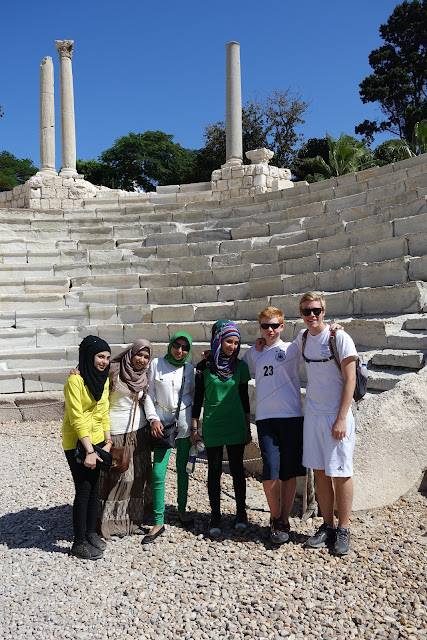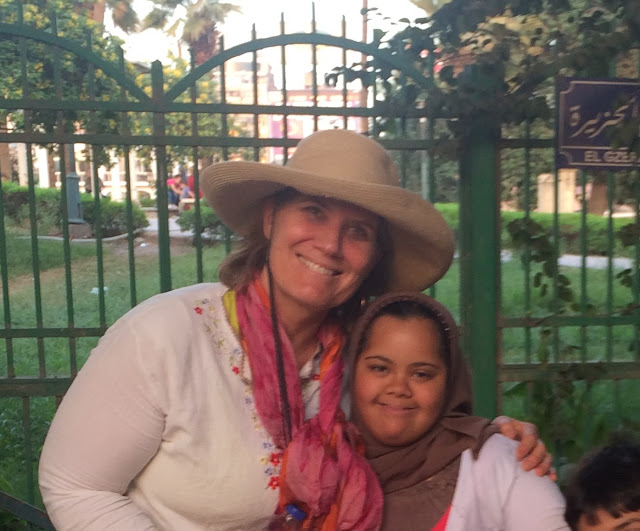 |
| At the Souq Watif, the open air market in Qatar. |
| An array of spice choices in any grocery store here in the the Middle East |
 |
| I was pleasantly surprised the grocery stores offer entire aisles of spices and herbs. You can buy many kinds of herbs to plant in the grocery stores here in the Middle East. |
If you are a person who enjoys the pungent, fragrant flavors of spices and herbs, the markets and grocery stores in the Middle East offer a seemingly endless assortment of choices. It is easily apparent that spices and herbs in their every variety are tremendously valued here. I feel I have more of a connection with a place when I understand the spices and herbs they use--whether it is for their cooking, medicinal use, aromatic smells, or even to view their vibrant colors. My own assortment of spices and herbs is akin to someone else's prized antique collection; I am always on the prowl to discover a new piquant flavor to add to my collection.
Since we have moved to the Middle East, I am even on more of a quest to capture new savory combinations of spices and herbs. Interestingly enough, I have found that it is a delightful way to enter into conversations and meet new people from other countries. Some friendships have even developed because some people sense my genuine interest. Strangers have shared recipes, childhood memories, and even old family stories that are conjured up by memories of herbs and spices.
Tonight at a dinner party at a friend's home in Abu Dhabi, Dana, a woman from India, immediately became enthusiastic when she talked about spices. She told us that many Indian families have their own secret combinations of garam masala and curries. Her eyes lit up with fond memories of cooking with aunties and her grandmother--stirring and blending the fragrant, warm, and sometimes sizzling spices (reminding me of the movie, The Hundred Foot Journey). http://www.youtube.com/watch?v=yEO1TWeM5JU One could almost smell the curry drifting through the window as she spoke. Dana told us all, as she flipped her long gorgeous hair back, the benefits of spices--of health, and beautiful nails and hair. The women all sat in attention as she spoke since we knew she had been a popular TV Indian actress, and had done hair commercials in India.
Another guest, Mailyn, a Chinese woman from Malaysia, recounted about going to the markets with her grandmother who was known in the area for her expertise in cooking and mixing spices. She said, "My grandmother would take me to the market to buy the whole spices, (like cardamon, ginger, hot chilis, cloves, etc) for her curry, and then we would dry them outside on reed trays in the yard. Since we lived in a tropical place and it would rain almost every day, she would then yell to her grandchildren, 'Go save the spice trays, kids, it's raining.' "
Mailyn continued, "The grandkids would gather the precious spices, and then I would volunteer to go with my grandmother to grind them by a skinny Indian man in the town. Since we lived in a tropical climate, I remember he only wore a small loin cloth. Spices of every color covered his skin, and I remember choking in the room with the hot dried chiles, but he was accustomed to it. My grandmother was quite famous in the area, and would then bring home the spices where she had a cottage industry of mixing them together. About ten of her grandkids would sit on the floor with small bags, and we would mix the secret blends, and then with a candle, seal the bags. We cousins chattered happily, not knowing the rich heritage of food that our grandma was giving us."
I have discovered spices and herbs somehow bring to the surface some of the fondest memories of our early lives. With the sense of smell, perhaps our most under appreciated sense, experiences come back with pleasant, and often times tender recollections. Simple sights and traditions from our past weave together again. Perhaps this is the reason I try to not only savor my own memories of herbs and spices, but to discover others' tales. Spices and herbs offer me the chance to experience in a direct way another culture or family story.
Sometimes my own kitchen's aromas are like a global tour of different countries. Depending on which day you come, you could be in India, Morocco, France, China, Mexico, or somewhere in the Middle East. I believe you widen your own sky when you partake of food from other countries other than your own-- especially when creating new flavors. It is an inexpensive way of exploring and discovering: awakening new pleasures, enhancing healthy food, and perhaps the most important, building memories with your loved ones.
 |
Getting a new recipe in an Istanbul market. |
An excellent guide to spices and herbs from around the world:
http://www.thekitchn.com/quick-guide-to-every-herb-and-spice-in-the-cupboard-108770
Here is a fall recipe from my daughter who is a dietician. Note: I have even made it two times this week. I used the Iranian pumpkins that we used for Halloween that were on my front porch. (You can see the photo of them before they were "soup" in the post called "My New Pumpkin Patch).
Butternut Squash Soup
2 Tab unsalted butter
2 Tab olive or coconut oil
4 chopped yellow onions (3 large)
2 Tab mild curry powder
5 lbs. butternut squash
2 tsp. kosher salt
1/2 tsp ground black pepper
2 cups water
2 cups apple cider or juice
Saute butter, oil, onions, and curry powder together in a large stockpot that is uncovered. Stir until onions are tender. Peel squash and cut up into chunks, along with the cored apples (I leave the skin on them). Add the squash, apples, salt, pepper, cider, and water to a boil. Simmer to a boil, and cook over low heat for 30-40 minutes until squash and apples are soft. Puree squash mixture with immersion blender or food processor. Add salt and ground pepper to taste. We added a dollop of creme fraise that was tasty!
Enjoy! Happy Thanksgiving to all!













